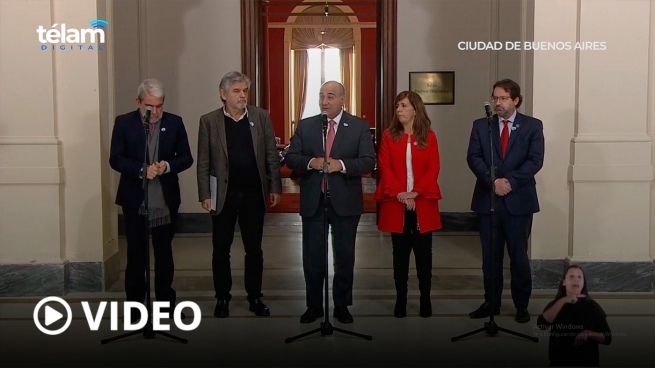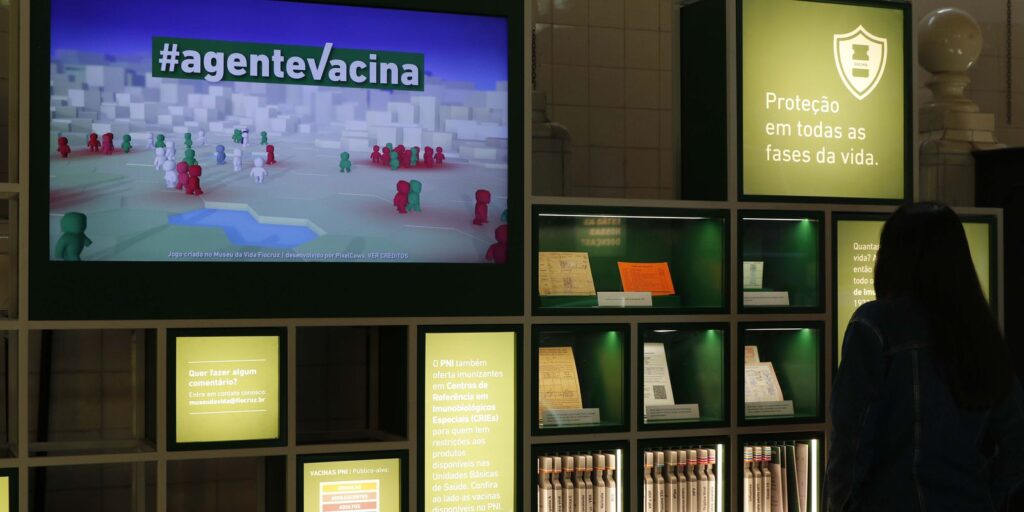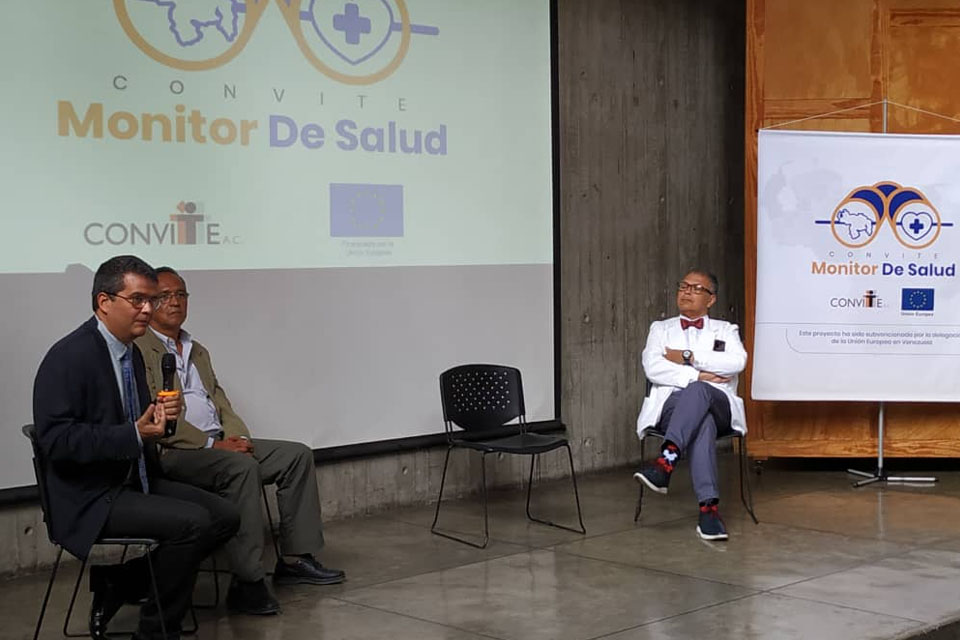The National Cabinet deliberated this Thursday at the Casa Rosada in a meeting in which the development of the 2022 Census was evaluated, by the National Institute of Statistics and Censuses (Indec), and the macroeconomic data that, for some months, was analyzed. they show the decrease in unemployment and the increase in industrial activity.
“It was an extremely productive meeting in which each of the ministers spoke about the management priorities. We have analyzed the present and everything that has to do with the near future,” the chief of staff, Juan Manzur, explained at a press conference. when making statements after the meeting that lasted for almost three hoursin which, in addition, he stressed that, “with the headwind, there are many things that are being done” by the Government.
“From the Government team we are going to do everything so that, In this difficult context, first take care of the most vulnerable sectors, but also not stop this growth dynamic that it is experiencing”Manzur stressed.
Manzur, who was accompanied by the Security Ministers, Aníbal Fernández; of Science, Technology and Innovation, Daniel Filmus; the director of the Indec, Marco Lavagna and the spokesperson for the Presidency, Gabriela Cerruti, described as a “phenomenal task” the survey carried out yesterday by the Indec to finalize the census, which was “a titanic job”, as he commented.
“Now follows the information processing stage. After three months, the first estimated data will be available by locality, by sex and number of peopleyes There were 652,000 people yesterday in the street taking the census, in coordination with the provinces,” said Lavagna.
After pointing out that “Argentina grew its GDP by more than 10% last year and these are rates that are on the rise,” Manzur pointed out that in parallel “We had a very important decrease in the level of unemployment, which is at 7%, and there are industrial activities that have resumed a capacity to start up their installed capacity at 70/80%”.
Manzur also said that one of the issues considered by the ministers at this morning’s meeting was “what is happening in the international context” and specifically how the development of the war between Ukraine and Russia affects the cost of food and energy.
Agriculture
About, Filmus said that, together with his peer from Agriculture, Julián Domínguez, analyzed the advances between the company Bioceres and Conicet regarding the development of HB4 transgenic wheatdrought tolerant, which was recently approved in Brazil, China, Australia and New Zealand.
“This is a potentiality has to do with the production, export and fundamentally with the capacity to incorporate foreign currency. It is a development that provides a 20% increase in productivity and can be carried out in areas where there are strong water stress processes,” the official described.
Official sources commented that Domínguez highlighted the importance of this variety of wheat, which constitutes “a guarantee for those producers who have little land”, and in an international scenario where “Europe is beginning to lower protectionist barriers”, to which is added the approval by different countries of the modified seed, which offers greater prospects for Argentine wheat
Domínguez pointed out that “Europe is in a difficult moment, from where difficult scenarios are proposed and there is talk of eventual famines in Africa, world recession and other problems, and in the face of this panorama, that we have lithium, wheat, gas, positions Argentina in unbeatable conditions,” the sources said.

About Transportation
Regarding the suspension of the UTA strike that affected medium and long-distance passenger transport in the interior of the country on Tuesday, Manzur stated that the conflict was “resolved” within the framework of “negotiations within the Ministry of Labor of the Nation.
Transport Minister Alexis Guerrerareferred to the rate table and said that state contributions are “easier” to control in the metropolitan area, where the subsidies are directed, than in the provinces, where there are full subsidies, the sources indicated.
Partnership with City
They added that the Minister of the Interior, Eduardo “Wado” de Pedro, detailed the negotiations with the city of Buenos Aires for the co-participation, which “are stuck” and “how to move forward to resolve the issue” is being analyzed, while the Minister of Labor , Claudio Moroni, commented on the results of the latest joint negotiations with different unions, and Public Works, Gabriel Katopodis, detailed the investments in his sector.
On this last topic, Manzur highlighted the “volume and magnitude of works that exist in Argentina with a phenomenal investment and that also has to do with closing gaps”, and said that “These are drinking water works, sewage and sewage treatment plants, in addition to large infrastructure works, such as trains, where there are works in more than 1,700 kilometers.
In addition, the coordinating minister mentioned President Fernández’s trip today to San Juan to inaugurate homes in an area affected by an earthquake, and which are added to “the almost 45,000 units that have been delivered to date and are in march 120 thousand more”.
Security
Manzur said that “there is a very ambitious work plan in terms of security” and gave the floor to Aníbal Fernández, who explained that it is an action “coordinated with the four federal forces (Gendarmerie, Prefecture, Federal Police and Police of Airport Security) that is yielding a superlative result”.
“In the crime of intentional homicide, Argentina has had a privileged situation since 2001 and 2002, when it began to fall systematically. We have a record of 4.3 murders per 100,000 inhabitants per year. A very auspicious number,” Fernández pondered.
Economy
On the other hand, Manzur said that the Minister of Economy, Martín Guzmán, “made a very detailed presentation” on the subject of inflation, which has an international impact as a consequence of the pandemic and the war in Ukraine.
According to the sources, Guzmán pointed out that “there are no arrears with the Paris Club” and highlighted the growth that is observed in the different sectors, and assured that there will be no shortage of foreign currency for fertilizers, a vital input for the countryside, nor for auto parts companies. , which were already reducing the percentage of imported inputs.
Health
They indicated that the Minister of Health, Carla Vizzotti, addressed the topic of integral change of paradigm that is being prepared in the different areas of health, such as agreements in the different national, provincial and municipal levels, and the regulations of judicial protection, among other aspects aimed at a reform of the sector.
“Everything we learned during the pandemic is going to be incorporated, and the use of resources will be improved, among other objectives to be met in the health system,” sources said.
For its part, the Minister of Culture, Tristan Bauer, He commented to his cabinet colleagues on the tasks that are being carried out to recover Tecnópolis, and that the property located in Villa Martelli “go back to what it was at the time of the government of Cristina Fernández de Kirchner.”
Regarding the request for extend the benefits of allowances, formulated in the last hours by the co-head of the CGT Pablo Moyano, Manzur assured that the Executive Power “is willing to evaluate all the proposals that are superior”, and maintained that “from the team that accompanies the President everything that is within reach so as not to stop this growth dynamic”.
















